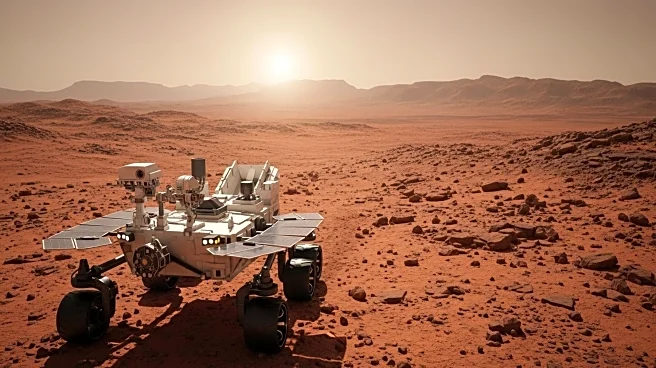What is the story about?
What's Happening?
NASA's Perseverance Rover has been exploring the Jezero Crater on Mars, revealing significant findings about the planet's ancient chemistry. The rover's analysis, in conjunction with data from the Mars Reconnaissance Orbiter, has identified deposits of clays and carbonates, indicating the presence of abundant water in Mars' past. These findings suggest that chemical reactions involving minerals, water, and possibly organic material could have created energy-rich environments on early Mars. The rover has discovered unusual minerals, such as iron phosphate and iron sulfide, embedded in clay-rich mudstone, which may have been influenced by organic material. These discoveries provide a detailed look at ancient chemical reactions and the potential for prebiotic chemistry on Mars.
Why It's Important?
The discoveries made by Perseverance are crucial for understanding Mars' potential to have supported life in the past. The identification of minerals that could have interacted with organic compounds suggests that Mars had environments that might have been conducive to life. This research not only enhances our understanding of Mars' geological history but also informs the search for life beyond Earth. The findings could have significant implications for future Mars missions and the study of astrobiology, as they provide insights into the planet's habitability and the processes that may have occurred in its ancient past.
What's Next?
The samples collected by Perseverance are expected to be returned to Earth for further analysis. These samples will allow scientists to conduct more detailed studies using advanced laboratory techniques, potentially revealing finer details about the minerals and the geochemical processes that shaped them. This could provide more definitive answers about the potential for life on Mars and the planet's chemical history. The continued exploration and analysis of Mars' surface will likely lead to new discoveries and a deeper understanding of the planet's past environments.
Beyond the Headlines
The research conducted by Perseverance and the Mars Reconnaissance Orbiter highlights the importance of interdisciplinary collaboration in space exploration. The integration of data from different sources allows for a more comprehensive understanding of Mars' geology and chemistry. Additionally, the use of advanced data processing techniques, such as those developed by researchers to improve the quality of orbital data, demonstrates the role of technology in enhancing scientific discoveries. These efforts contribute to the broader goal of understanding the potential for life beyond Earth and the conditions that may support it.
















